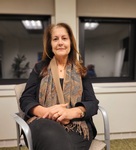
Susan came to CancerCare for support after losing her husband Doug to cancer. She had previous experience with CancerCare when she was coping with the loss of her mother 25 years before. Joining a bereavement support group at CancerCare allowed her to connect with others who had similar experiences that gave her greater perspective on her own experience with loss.
One of the unique challenges of losing a spouse can be the loss of identity and feeling like you have a new identity. “People say you’re closing a chapter and I kept on thinking, no, I’m closing a book,” shared Susan. “I have to reinvent an entire book.”
Partners often decide on a division of labor for household tasks such as finances, cooking and upkeep. As a result, those who have lost a partner take on and learn new responsibilities during their bereavement experience. For example, Doug handled the household’s finances and Susan had to assume this responsibility while she was coping with her loss.
“You have to give yourself a little grace and patience that this is a new skill,” Susan advised. “You will know it and you will get better, but right now, you have to be okay with making the mistakes.” She also suggests writing important information down and asking for help.
The physical effects of grief were also a challenge for Susan. This included changes in her sleeping patterns, as well as unexpected reactions during everyday activities such as showering or listening to music. “I don’t think you’re prepared for how every part of your body reacts and feels physically sick when you hear a song on the radio.”
Susan also felt the emotional effects of grief in her everyday life. After enjoying reading before the loss of her husband, she was only able to read grief books, thinking that they would have “the answer” to the challenges she was facing.
While coping with the loss of her husband, Susan experienced both unhelpful and helpful interactions with others. Unhelpful interactions included people trying to show her the “bright side” of her grief. “People try to give you comfort by seeing the bright side of things and I think what needs to be thought of is that it’s okay to just witness someone’s grief.”
“Witnessing someone’s grief” can include listening to the bereaved person speak about who they lost. “Let me talk about Doug and leave it at that. There’s nothing else you need to do,” Susan said. “That’s what I’ve learned from the path - that you don’t have to talk and you have to just witness.”
The holidays represented a complicated time after Susan lost Doug. Anticipating bigger holidays was more challenging than the holidays themselves. “Getting through them was never the big problem of the day. It was more of the anticipation of the day and getting myself worked up about that,” Susan shared. “Usually for the day, I get comfort out of being around my family.”
Even with the comfort of her family, the holidays themselves could still be difficult for Susan. “If I felt too overwhelmed, I would go into the room and be quiet for a while. I took care of myself knowing that’s what I would need.”
Personal holidays such as birthdays or anniversaries, or smaller holidays such as Valentine’s Day were also complicated. Susan described the grief of seeing anniversary and Valentine’s Day cards at the store.
Linking memories to her daily life allowed Susan to stay connected to Doug. “He’s always in my heart and soul, always in my memory, and I link it back to him every day,” said Susan. She enjoys both verbally sharing the memories with others and thinking of the memories by herself.
Susan learned from her experience with grief and can pass on her knowledge to people experiencing similar loss. For example, she helped a friend coping with the loss of her husband understand the practical facets of bereavement. “The emotional support is very important, but you have to have the nuts and bolts.”
After learning from her experience, Susan would tell her earlier self to be patient as she felt all the complicated and changing emotions that come with grief. “Somehow your body and your soul and your mind have come to a place of actually finding joy again.”
